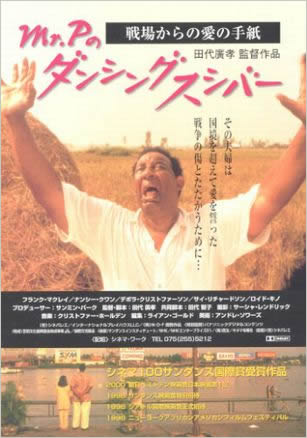
Taking a Look at the 1998 Sundance Film Festival Catalogue: The Japanese Filmmakers
The Japanese Filmmakers of Sundance 1998 – Where Are They Now?
Whilst browsing the shelves of Book Off in Akihabara, I came across a fantastic time capsule: the original catalogue from the 1998 Sundance Film Festival. At ¥500, I grabbed it immediately, and was further delighted when the checkout staff informed me all foreign books were half price that day. The booklet is 312 pages of great ’90s design and advertising for long-forgotten products and services. The likes of Northwest Airlines, the iOmega Jaz, and Film Finders are all immortalised in its pages.
Looking through the index reveals that three Japanese filmmakers screened at Sundance 1998. How many are still making films, and how many were forgotten like these products?
Kitano Takeshi – Hana-bi
Of course, Kitano “Beat” Takeshi was already an internationally-acclaimed filmmaker by 1998. 1993’s Sonatine had screened at Cannes, and by the time Hana-bi entered production Kitano had directed six feature films. Today, Beat Takeshi remains one of Japan’s few bona-fide celebrities to experience long-lasting success, fame, and recognition; so much so that you could probably turn on the TV at any given moment in Japan and find him on at least one channel. Whilst 2010’s Outrage screened at Cannes, and he is a regular at Venice Film Festival, Kitano hasn’t quite reached the same levels of universal acclaim as he did in the 1990s.
The story of an unemployed violent cop who must care for his dying wife, Hana-bi epitomises Kitano’s filmmaking style, utilising long takes, stillness, and brief moments of explosive violence to create a lean story of utterly agonising tragedy. The only film of these three to still be in publication, it is readily available on DVD and Blu-Ray.
Sabu – Postman Blues
Neither the Indian star of The Drum (Zoltan Korda, 1938), nor the American professional wrestler, the Wakayama-born actor/director Sabu may not be as well known as such superstar Japanese filmmakers as Beat Takeshi, or Miike Takashi (whose 2001 Ichi the Killer Sabu acted in) but he continues to screen on the festival circuit. His 2017 feature, Mr. Long screened in competition at the 67th Berlinale and reports suggest that he is currently working on a project titled Jam, starring members of Gekidan EXILE, the pack of male actors managed by LDH (the company behind E-Girls, Exile, and J Soul Brothers).
Postman Blues was his second feature film and is a comedy crime thriller about a postman who is mistaken for a yakuza member by the police. It is available to watch on Netflix, or a very expensive second-hand DVD can be found on Amazon.
Tashiro Hirotaka – Mr. P’s Dancing Sushi Bar

The trailer for Mr. P’s Dancing Sushi Bar was impossible to locate, so you will have to do with the poster instead.
Winner of the inaugural NHK-sponsored Cinema 100/Sundance International Award with his 1996 script for Mr. P’s Dancing Sushi Bar, Tashiro screened the completed project at the Sundance Institute’s Screening Room as part of a special programme of Cinema 100 award-winners. The film seems to have been largely forgotten, as, unfortunately it appears has Tashiro. According to IMDb, Tashiro directed just one episode of a TV documentary series in 2001 after this film.
According to the catalogue, Mr. P’s Dancing Sushi Bar is the story of an African-American Vietnam veteran struggling to keep his Los Angeles sushi bar business afloat, whilst projecting his war traumas on his Japanese-American wife. For those keen to check it out, there seem to be a few used DVDs of the film available on Amazon.
Conclusion
What conclusion can we draw from these films and filmmakers? The biggest takeaway is that even screening at Sundance does not guarantee career success. Perhaps there is room for further assessment of the careers of Japanese filmmakers directing Western-set films. Japanese cinema has had a history of self-orientalisation in order to be seen in the US/Europe, constructing an image of itself as an unknowable ‘Other’, markedly different from Western cinematic norms. Those few Japanese filmmaker to direct a Western-set Hollywood production (such as Nakata Hideo or Shimizu Takashi) have not had long-lasting success overseas, returning to making films in Japan after just one or two projects. Even Golden Lion-winner Kitano Takeshi shot only one film outside Japan, the much-maligned Brother (2000). Is this simply a case of the difficulty of adapting across film cultures, or does this reflect an unsavoury, orientalist trend in film reception by Western audiences? Are Western film-viewers only interested in Japanese films from Japanese filmmakers, that show an exotic Other world that they have no opportunity to encounter in their everyday lives?
Short Film Rec: That One Day (Crystal Moselle, 2016)
Directed by Crystal Moselle, whose two feature films The Wolfpack and Skate Kitchen screened at Sundance in 2015 and 2018 respectively, That One Day features a gang of girl skaters, who are narratively allowed to be just friends. This is refreshing when film tropes tend to represent women either as illicit lovers, or as enemies often competing over the same men.
